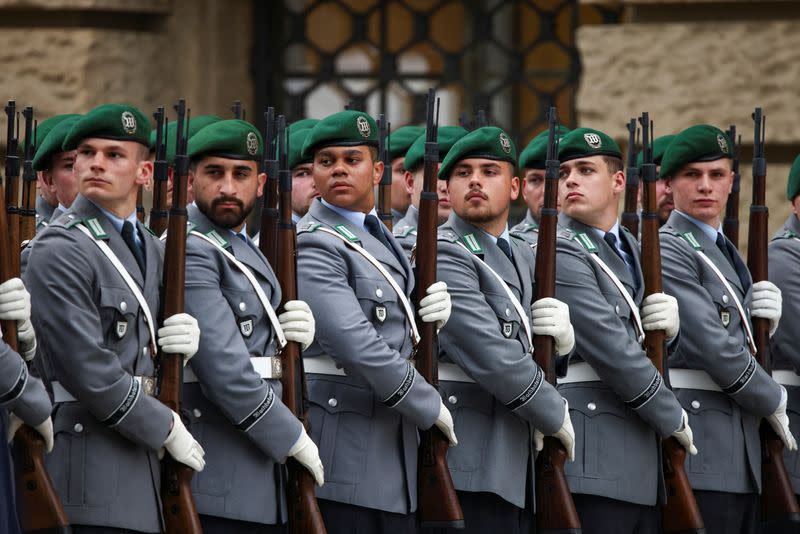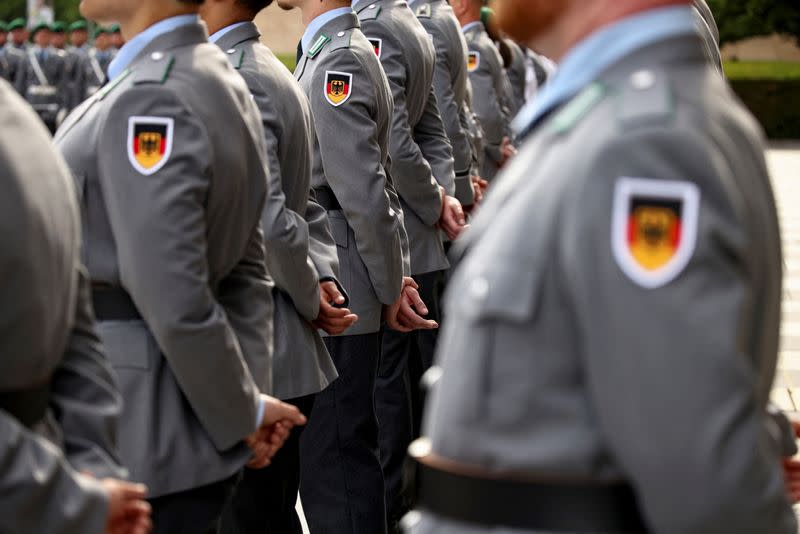Germany needs 75,000 more troops as NATO eyes Russia threat, Spiegel reports
By Sabine Siebold
BERLIN (Reuters) -Germany's defence ministry believes it will need at least 75,000 additional troops to fulfil its NATO commitments as the alliance adapts to face what it sees as an increasingly hostile Russia, Spiegel magazine reported on Friday.
Calls for more troops could present another headache for the government, which is grappling with how to finance a surge in defence spending following Russia's 2022 invasion of Ukraine and has debated reintroducing some form of military service.
NATO leaders signed off last year on the first major defence plans since the Cold War ended, detailing how the military alliance would respond to a Russian attack.
The move signified a fundamental shift - NATO had seen no need to draw up such plans for decades, as it fought smaller wars in Afghanistan and Iraq, and felt certain post-Soviet Russia no longer posed an existential threat.
NATO and national military planners have been translating the plans into concrete requirements, identifying shortages of troops, weapons and other equipment needed to defend against a Russian attack that could, according to the German military's top brass, come as early as 2029.
Based on requirements, allies will have to negotiate which country will fill which capability gaps.
The requirements will include tougher targets to bolster air defences, long-range missile stocks and logistics capabilities, a European diplomat told Reuters.
After the Cold War, many NATO allies reduced the number of air defence units to reflect the assessment that they would have to deal only with a limited missile threat coming from countries such as Iran.
Germany had 36 Patriot units when it was NATO's frontline state during the Cold War. It now has nine such units.
COSTLY PLANS
The new NATO requirements mean Germany's armed forces, the Bundeswehr, will need an extra 75,000 troops to fill additional allied corps, divisions and brigades needed to implement the defence plans, Spiegel said, citing confidential defence ministry documents.
A senior military source told Reuters the figure might need to be higher as Germany would be a major staging area and logistics hub in a conflict, suggesting a "mid-five-digit figure" on top of the 75,000.
The ministry was not immediately available for comment.
The Bundeswehr now has some 180,000 soldiers and 80,000 civilian employees.
Defence spending has become a pinch point for Chancellor Olaf Scholz's three-way coalition in discussions for next year's budget.
Scholz unveiled a 100-billion-euro ($108.15 billion) fund in 2022 to overhaul the military. Germany is now set for the first time since the Cold War ended to meet a NATO commitment to spend at least 2% of gross domestic product on defence.
But after overcoming a budget mess at the start of this year, the government is again haggling over how to continue funding the military once the 100 billion pot expires.
Scholz has backed his finance minister who rejected demands by Defence Minister Boris Pistorius to raise the defence budget, now foreseen at some 52 billion euros, by another 6.7 billion euros in 2025.
Pistorius has also tasked his ministry with exploring potential models for re-introducing a form of military service.
Spiegel said he would unveil plans to recruit 10,000 people a year, asking volunteers to fill out a questionnaire in a campaign with the slogan "Best year of my life".
($1 = 0.9246 euros)
(Reporting by Sabine Siebold; Writing by Sabine Siebold and Matthias Williams; Editing by Miranda Murray, Gareth Jones and Timothy Heritage)

 Yahoo News
Yahoo News 

